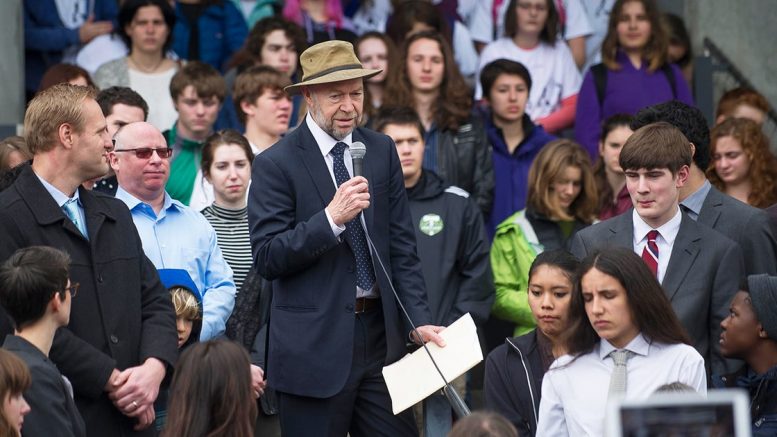It’s somewhat fitting that President Trump, who has named climate deniers and a former fossil-fuel executive to top cabinet posts, including at the EPA, would end up a defendant in what’s likely the highest-stakes climate lawsuit on the planet. The suit, brought by Our Children’s Trust on behalf of nearly two dozen youth and climate scientist James Hansen, seeks a real and comprehensive climate plan from the U.S. government.
Plaintiffs could see the “trial of the millennium” on climate change
Earlier this month, not long after the plaintiffs’ lawyers replaced President Obama with Trump in the suit, the administration filed a request for interlocutory appeal – a rare request since appeals are usually filed after a trial judgment, not before. Trump’s lawyers also objected to a letter sent to federal agencies demanding that they preserve climate data and emails between the administration and the fossil-fuel industry that might prove the government has known since the 1960s about the dangers to public health posed by fossil fuels.
Lawyers for Trump are responding quickly and aggressively to a case that will embarrass and interfere with the administration’s efforts to roll back environmental regulations and kneecap the EPA. Tuesday’s executive order makes clear Trump’s plan to dismantle Obama’s climate legacy, including the Clean Power Plan, which cuts power-plant emissions.
The Obama administration had argued that the lawsuit was unnecessary because the government was already addressing climate change. “The Trump administration is going to fight much harder to try to keep us away from trial,” says the plaintiffs’ lead attorney, Julia Olson. “They want to put on the stop light. They’re taking the position that the president and the executive office of the president shouldn’t be in court, that the court doesn’t have jurisdiction to order the president and the executive office to do anything. They apparently believe that the president is above constitutional review.”
Filed in 2015 against Obama and multiple federal agencies who were joined later that year by industry representatives as defendants, Juliana v. United States employs Atmospheric Trust Litigation to argue that America’s natural resources belong to the people and are held in trust by the government. The plaintiffs claim that by promoting and extracting fossil fuels, and ignoring the grave environmental dangers they pose, the government is denying young people and future generations their constitutional right to a healthy and stable atmosphere and environment. “The people who are going to be dealing with climate change in the future are young people,” says 17-year-old Victoria Barrett, a co-plaintiff in the case and a high school senior from New York who has addressed the United Nations and the COP21 conference in Paris. “And the people who’ve contributed the least to the issue at this point are young people. Me and my other 9- to 21-year-old friends, we didn’t make those choices. It’s discriminating against young people, because these older lawmakers aren’t considering posterity. These issues are going to be effecting posterity and my kids, and my kids’ kids, and my kids’ kids’ kids.”
How challenging will it be to sue Trump, whose proposed budget slices funding for climate research, and who has threatened to withdraw the U.S. from the Paris climate agreement? “I think it was harder suing the Obama administration – not factually and not in court, but in terms of public perception,” says Olson. “A lot of people believed that because of Obama’s rhetoric on climate change, which was quite good – he talked about needing to stop climate change for children and future generations – he was talking our talk.
“But what he was doing in terms of using the federal government, a lot of it was bad on climate,” she says. “He was trying to shift things [in] very minimal baby steps – not nearly the response that you need when you’re in an emergency.”
Twelve-year-old plaintiff Hazel Van Ummersen from Eugene, Oregon, sees the upside of Trump as an adversary. “I’m of the opinion that this new administration is more beneficial. Rex Tillerson was CEO of Exxon and [there are] a lot of things that … are going to drastically benefit our case,” she says. The plaintiffs’ lawyers hope to depose Tillerson, the newly minted secretary of state, who’s already part of a climate-related investigation by New York Attorney General Eric Schneiderman. Having won his case against coal giant Peabody Energy, for “misleading shareholders, regulators and the public about the risks posed to the company by climate change,” Schneiderman is looking at whether Exxon is doing the same thing. Earlier this month, Schneiderman revealed that while Tillerson was CEO of Exxon, he used an email alias – Wayne Tracker – for internal communication, including on subjects related to climate change. Schneiderman also accused Exxon of failing to reveal this fact to his office. Calling the use of email aliases a simple effort to expedite email traffic at the company, Exxon admitted that up to a year’s worth of Wayne Tracker emails may have been lost to a software glitch.
Source: www.rollingstone.com




